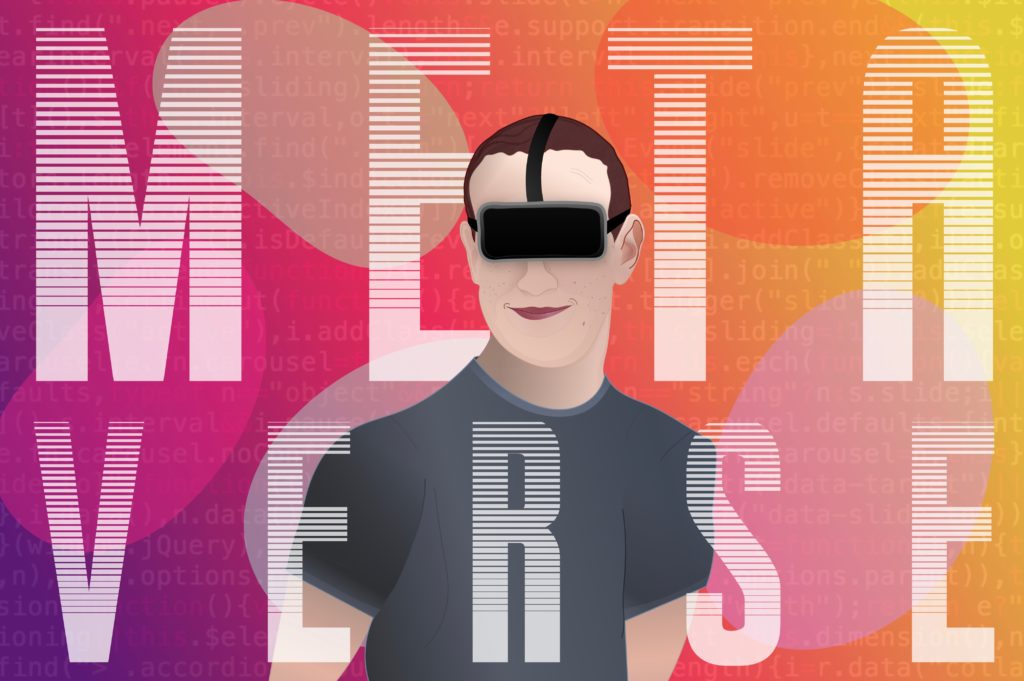
Merriam-Webster, the dictionary folks, get a lot of well-deserved PR at the end of each annum when they announce their “word of the year.” Last year, to no one’s surprise, it was “vaccine,” an oft-said word from the beginning to the end of 2021.
This year, I have an early favorite. With just one quarter of 2022 in the books, my pick to click is “meta” or “metaverse.” Not since online gambling and cannabis has it stirred up so much optimism, particularly in broadcasting circles, where most of the Pollyanna’s have left the radio ranch.
A recent story in Venture Beat was written for these times when corporate teams are trying to get their virtual heads around this ethereal concept – and cash in. Written by Koloawole Samuel Adebayo, “How organizations can succeed in the metaverse” makes the case that businesses of all sizes need to confront this great financial unknown by forging a strategy and a plan.
A study that none of us can afford by Emergen Research estimates metaverse revenue will top the $800 billion mark in six years. Adebayo references a recent report by Grayscale claiming that virtual land and property sales will become a $1 trillion marketplace.
And Gartner boldly predicts that one in four of us will spend a minimum of an hour kicking around the metaverse by 2026.
Thanks to what they call “the new wave of virtual reality (VR) and augmented reality (AR),” companies across the spectrum have the potential to reap mega dollars.
Like the early Internet wave in the 90’s (that didn’t end so well for many), Venture Beat insists “the early adopters and early adapters” will thrive.
IF they can figure how what the metaverse is, and how their brand fits in.
Samuel suggests we do our homework, and seek out meta experts like MeetKai an L.A. group that calls itself an AI=powered conversational intelligence company. Their VR platform is MeetKaiMetaverse, and this video provides a quick walk-through of their vision of the metaverse:
For many people, it was Mark Zuckerberg who introduced them to the concept behind the metaverse. Changing the company name to Meta – not surprisingly – telegraphs Zuckerberg’s intention about the next piece of tech real estate he has designs on.
Remember also that Facebook bought Oculus way back in 2014 for what may be considered the paltry sum of just $2 billion, the only indication you need that Zuck has his eyes on the virtual reality headset space.
Techsurvey 2022 tells us only 6% of our entire sample owns one of these devices – a number that has not moved in five years of asking about these devices. This is yet another indication the metaverse is still a very nascent opportunity.
another indication the metaverse is still a very nascent opportunity.
But how do we define it? Recode’s Shirin Ghaffary wrote a great story last November – “Why you should care about Facebook’s big push into the metaverse.” She mashed up the philosophies of people like Zuck and other meta folks and came up with this definition:
“A way for us to make our virtual lives more seamlessly integrated with our real lives”
Like so many tech realities today, the entire concept has it roots in fiction. For decades, authors like Jules Verne, Ray Bradbury, Isaac Asimov, and Philip K. Dick have painted dsytopian and futuristic pictures with their words. So you won’t be surprised to learn the term, “metaverse,” first appeared in Neal Stephenson‘s 1992 sci-fi novel, Snow Crash.
What about our “real lives?” Why would we want to leave them being – at least for a while – to experience a virtual world?
Tech guru and cybersecurity expert, Daniel Miessler, explained this phenomenon very well in a short piece he wrote this past November. In “Why The Metaverse Will Succeed,” he describes the virtual world as “humanity’s escape hatch.”
His premise is that reality – a.k.a. “real life” – is lousy, and millions – and maybe billions – of us would rather be elsewhere.
Miessler premises his theory on “the rich get richer” doctrine that might actually be called “The 90:10 Rule” where 10% of pretty much every piece of the economy are reaping in the lion’s share of the profits.
Here’s how he puts a point on the metaverse, and why it will ultimately be successful:
 “Jobs don’t pay enough. The work sucks. You don’t have any control over your life. You can’t afford a nice place unless you live somewhere without good restaurants. And even then you’re barely surviving because there are no jobs there.
“Jobs don’t pay enough. The work sucks. You don’t have any control over your life. You can’t afford a nice place unless you live somewhere without good restaurants. And even then you’re barely surviving because there are no jobs there.
“They’re looking for an escape hatch from this thing called reality. THAT is what makes the metaverse a multi-trillion-dollar thing. THAT is the reason NFTs will dominate. THAT is the reason crypto and blockchain will succeed (in some form).”
I know who he’s talking about – and so do many of you. Miessler is pointing right at many of the types kinds of people who are regular listeners to commercial radio. They’re working stiffs living paycheck to paycheck, trying to take a vacation, and just get a night out. They’re our contest players – the ones texting and calling in to win.
Many of their big dreams and aspirations about life, jobs, homes, and cars have been dashed by recessions, pandemics, and life’s other bitter pills.
If anyone knows how to talk to them, it’s radio programmers and talent. These are the folks who show up at events, phone store openings, and hospital radiothons.
folks who show up at events, phone store openings, and hospital radiothons.
So, welcome to the metaverse – a virtual playground where any experience is attainable for a reasonable admission fee; a place to escape from the doldrums of being IRL.
But here’s the rub. The metaverse is about giving people amazing experiences. Everything you read about how these moments need to be personalized, exclusive, fun, exciting, limitless, and niche.
And these are things most radio stations don’t do especially well. Listening to our stations over the air and certainly online are often tedious and frustrating experiences, littered with too many commercials packed in to endlessly long bundles each hour.
Tuning in many radio stations in new cars with giant screens is disappointing when metadata is flat-out wrong or abused. Segments where commercials scroll or advertiser logos show up in the middle of content are all too common in my “real life car” – forget about a virtual one.
And calling a radio station – especially an air studio – is rarely a pleasant experience. What other business or brand lets the phone ring incessantly or “busies them out?”
 Venture Beat’s Adebayo suggests newcomers to the metaverse start small and simple. Like a voice concierge app that uses VR/AI to communicate with callers asking about “The Birthday Game” or how much “EdgeFest” tickets cost.
Venture Beat’s Adebayo suggests newcomers to the metaverse start small and simple. Like a voice concierge app that uses VR/AI to communicate with callers asking about “The Birthday Game” or how much “EdgeFest” tickets cost.
It’s not a stretch to imagine radio stations reinventing car dealership remotes in a meta world, artist meet & greats, or local expos where fans can check out the wares without leaving their easy chairs. Radio’s megaphone works IRL and in the metaverse.
This is the equivalent of kindergarten in meta world, but radio has to start somewhere. It’s not the coolest house in the metaverse neighborhood, but it gets us in the door.
Before we get too carried away by the promises of reaping vast riches from our grand meta plans, let’s figure out how to answer the damn phones.
Then we can tackle the challenges and opportunities in front of us in the metaverse.
- Media And Technology In 2025: Believe It Or Not! - April 18, 2025
- In Radio, You Just Never Know - April 17, 2025
- The Secret To Making A Great Podcast (And Great Radio) - April 16, 2025




Fred,
I love this! It’s very thought provoking. How about adapting the way we give them a great experience? How about training them to expect and enjoy something different? It all comes down to how radio adapts to the future. (For example) Answering the damn phone just isn’t going to happen. So, maybe it isn’t the phone where we connect. People are liking actually talking on the phone less and less. To live in a world where we think we have to get back to something that seems so jurassic, is exactly the problem in radio. We can’t operate from where we were operating in the past. To fit into the new way of things, we have to embrace the new ways people connect. The answer is something digital. I think we START the conversation there. To go back to what worked 20+ years ago is what’s killing our business.
Thanks again for a great read!
As another commenter pointed out, radio broadcasters were slow to embrace digital (some still are). As Venture Beat points out, companies need to get going if they’re going to have a presence in the metaverse. That doesn’t mean DOING something right now, but learning, planning, and hiring to meet the opportunity is essential. Always great to hear your “take,” Tammie.